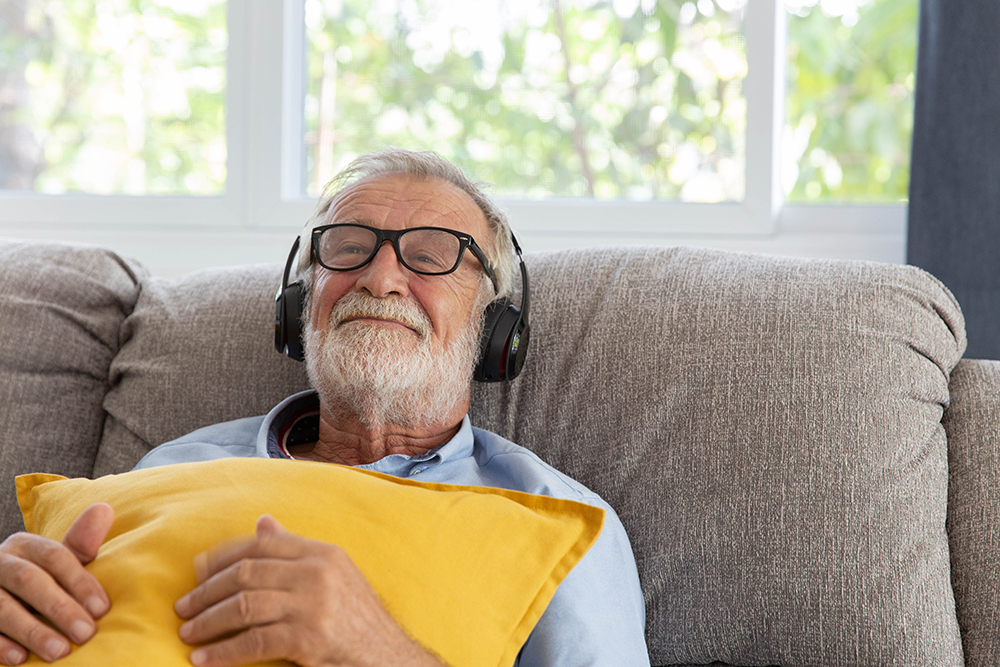Asset Publisher
Creating Your Own Self-Care Kit
By Ashlee Williman | 02/17/2020

An older adult listening to music on his headphones
It is no secret that self-care can have many benefits to our mental, physical and emotional health. According to research, practicing self-care can decrease stress, improve well-being, lower mortality, increase relaxation responses and decrease healthcare costs. While it can often be challenging to find the time to practice self-care, it is important for us to plan for and look for ways to integrate it when possible. We asked several Rose Centers for Aging Well participants to share tools they use for self-care. Here’s what they recommended:
- Music – Listening, singing, humming or whistling to our favorite artist or genre of music can help improve our spirit, mood and brain health, and decrease our stress. Some of the Rose Centers participants’ favorites include smooth jazz, gospel, Motown classics and relaxing instrumental pieces. We may even choose to participate in a community choir, join in at a faith-based service or simply sing in the shower!
- Aromatherapy – The National Association for Holistic Aromatherapy states, “The practice of aromatherapy uses natural plant extracts, such as essential oils, hydrosols, and carrier oils, in a variety of ways to heal the body, mind and spirit”. Some benefits of essential oils may include “relief from anxiety and depression; improved quality of life, particularly for people with chronic conditions; and improved sleep,” as reported by MayoClinic.
- Comforting blankets or clothes – Relaxing in comfortable clothes or wrapping up in a cozy blanket is a simple, but important example of self-care. Additionally, weighted blankets may be a great option for relieving pain, lessening anxiety and improving your mood, according to Healthline.
- Coloring – This calming activity can be a great way to relax and get our creative juices flowing. Adult coloring books can be purchased at many retail stores, or free printable pages can be found online at websites such as Crayola. They also can serve as thoughtful, inexpensive gifts.
- Dancing – Participating in a line dancing class, moving along to the music while seated or dancing throughout our residence can have benefits both mentally and physically. Research shows that dancing can help us improve our gait, balance, range of motion, body image, muscle endurance and flexibility.
- Sports – Cheering on our favorite sports team can be an excellent way to take our mind off things, and depending on the outcome, bring us joy! Additionally, participating in a friendly game with others can be great for our physical health!
- Connecting with family and friends – Whether it’s grabbing a cup of coffee with a friend or chatting with a family member over the phone, staying connected with others can have many benefits, such as increased feelings of happiness and decreased loneliness. It can be very valuable to have someone to share our highs, lows, challenges and joys with.
- Journaling- Putting a pen or pencil to paper is a non-judgmental way to help clarify and deal with our thoughts and feelings. The process may even help us understand ourselves better. Daily journaling provides an opportunity to look back on our day with fuller appreciation, making it a great mental and spiritual activity. Research also shows that writing can decrease depression, reduce stress and improve self-esteem.
- Do something nice for someone – According to research, acts of kindness boost the well-being of not only the receiver, but the giver and overall community as well. Smiling, holding open a door and giving a compliment are all free!
Related Assets
Suggested Reads
Honor Your Mental Health on World Mental Health Day
Sunday, October 10, is World Mental Health Day. Those of us who serve on the staff of the Behavioral Health Services (BHS) department of the Benjamin Rose Institute on Aging demonstrate our dedication and commitment to helping older adults with mental health i...
Managing Caregiver Stress
Though caregiving may bring us many positive opportunities to spend time with and provide support for a loved one, we may also regularly encounter stressful situations and struggle to find that elusive work-life balance. In fact, research shows that being a ca...
Practicing Mindfulness as an Older Adult
There’s no question that caring for our physical health is one of our most important concerns as we age. But maintaining physical wellness comes with concerns and sources of stress that can leave us feeling worse for wear. Whether it’s a disheartening doctor’s...
What Does Wellness Look Like for Dementia Caregivers?
Anyone providing care for a loved one with dementia knows how stressful it can be. Not only can the tasks involved be challenging and exhausting, but there is a very emotional level as well. But even with all the challenges , caregivers often neglect self-care...
